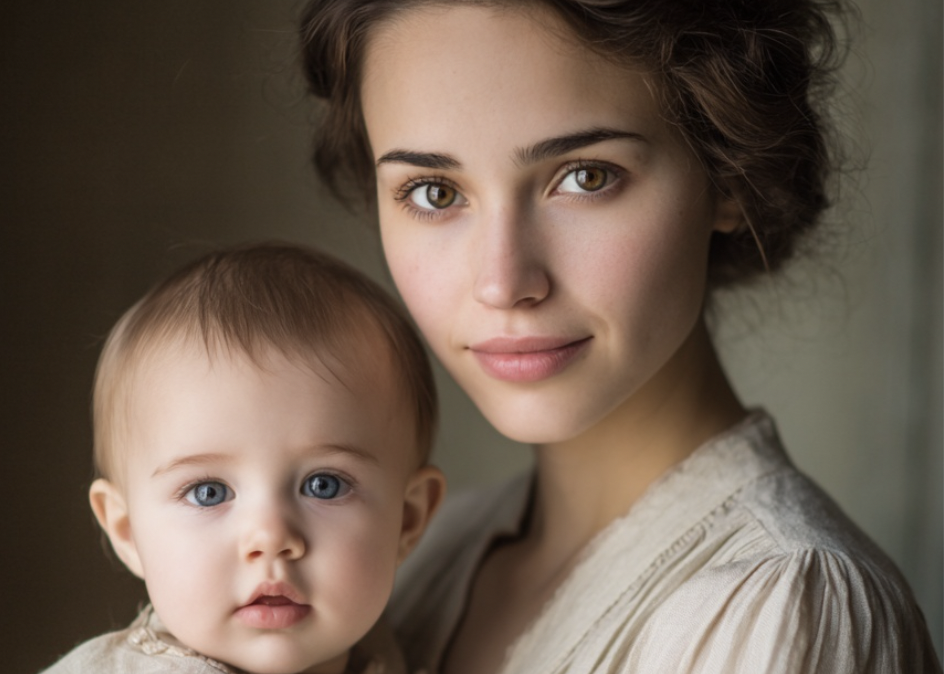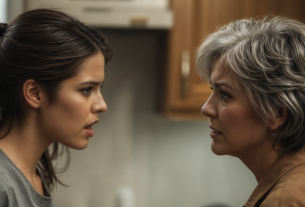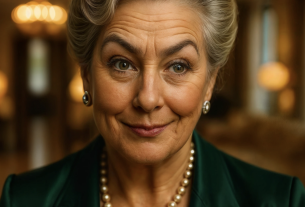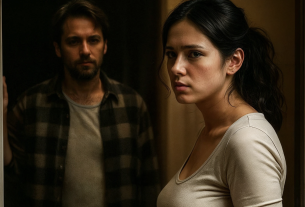“Misha, look!”
I stopped at the gate, stunned.
My husband stumbled over the threshold, shoulders bent beneath a sloshing bucket of fish. July’s morning chill gnawed at me, but the sight on the bench burned away the cold.
“What is it?” Mikhail set the bucket down and came closer.
On the rickety bench by the fence sat a wicker basket. Inside, wrapped in a sun-faded cloth, lay a child—no more than two.
Huge brown eyes fixed on me—no fear, no curiosity—just that steady, unblinking look.
“My God,” Mikhail exhaled. “Where did he come from?”
I brushed a finger through the boy’s dark hair. He didn’t flinch or cry; he only blinked.
His tiny fist gripped a crumpled scrap. I eased his fingers open and read: “Please help him. I can’t. Forgive me.”
“We have to call the police,” Mikhail frowned, scratching his head. “And tell the village council.”
But I was already lifting the boy, tucking him against my chest. He smelled of dusty roads and days without a proper wash. His romper was threadbare, but clean.
“Anna,” Misha said carefully, worry in his eyes, “we can’t just… keep him.”
“Yes, we can,” I answered, meeting his gaze. “We’ve waited five years. Five. The doctors say we’ll never have children. And now…”
“The law, the paperwork… what if his parents come back?” he protested.
“They won’t,” I said quietly. “I know they won’t.”
The child flashed a sudden, wide smile, as if he’d understood every word. That was enough for me. With the help of acquaintances, we pushed through guardianship and papers. It was 1993—nothing was simple.
A week later, something felt wrong. I had named him Ilya. He didn’t react to sound at all. At first, we chalked it up to a dreamy temper.
But when the neighbor’s tractor roared past the window and Ilya didn’t even twitch, my stomach dropped.
“Misha… he can’t hear,” I whispered that night, after laying him in an old cradle we’d borrowed from a nephew.
Mikhail stared into the stove’s fire for a long while. At last he sighed. “We’ll take him to Dr. Nikolai Petrovich in Zarechye.”
The doctor examined Ilya and spread his hands. “Congenital deafness. Complete. This isn’t a surgical case.”
I cried the whole drive home. Mikhail said nothing, gripping the wheel until his knuckles blanched. That evening, when Ilya finally fell asleep, he pulled a bottle from the cupboard.
“Misha, maybe don’t—”
“No.” He poured half a glass and swallowed it in one go. “We’re not giving him back.”
“Giving who—?”
“Him,” he said, firm as oak. “We’ll keep him. We’ll manage.”
“But how? How will we teach him? How do we—”
Mikhail lifted a hand, cutting me off. “If we have to, you’ll learn. You’re a teacher. You’ll figure it out.”
I didn’t sleep that night. The ceiling swam above me and my thoughts wouldn’t quiet: How do you teach a child who lives in silence? How do you give him everything?
By morning, an answer settled in: He has eyes, and hands, and a heart. That’s enough.
The next day I grabbed a notebook and sketched a plan—books to find, methods to try, ways to teach without sound. From that moment, everything changed.
Years slipped by. One autumn—when Ilya turned ten—he sat by the window, drawing sunflowers. In his sketchbook they didn’t just stand; they whirled, bright and alive.
“Misha, look,” I touched my husband’s shoulder. “Yellow again. He’s happy today.”
I learned finger spelling first, then full sign language. Ilya and I built a language of glances, gestures, and touch. Mikhail learned more slowly, but the essentials—“son,” “love,” “proud”—he signed perfectly.
There was no school for deaf children in our village, so I taught him myself. Reading came quickly—letters, syllables, words. Numbers came quicker. But drawing eclipsed everything. He drew constantly, on anything.
At first, it was a fingertip tracing shapes on misted glass. Then charcoal on a board Mikhail made. Later, paints on paper and canvas. I saved kopecks and ordered proper colors from the city.
“Your mute kid scribbling again?” our neighbor Semyon sneered over the fence. “What good is he?”
Mikhail straightened up from the carrot bed. “And you, Semyon, what good are you—besides flapping your jaw?”
The villagers didn’t make it easy. They didn’t understand us. Children mocked Ilya; some adults weren’t better.
He came home one day with a torn shirt and a scratch down his cheek. Without a word, he pointed toward the culprit—Kolka, the headman’s boy.
I cried while cleaning the cut. Ilya wiped my tears with small, paint-stained fingers and smiled, as if to say, It’s all right.
That night, Mikhail left the house and returned late with a bruise darkening under his eye. After that, no one touched Ilya.
As he grew, his drawings shifted. A voice emerged—pure, unmistakable—born from silence. Our walls filled with paintings that took your breath away.
A district commission came once to inspect our homeschooling. A stern older woman stepped in, caught sight of the canvases, and froze.
“Who painted these?” she asked in a hushed tone.
“My son,” I said.
“You should show them to professionals,” she replied, removing her glasses. “This is a real gift.”
We were afraid. The world beyond our lanes felt too large, too loud—for a boy without sound, for parents who spoke with their hands.
“We have to go,” I insisted, packing a small case. “There’s an art fair in the district center. He needs to be seen.”
Seventeen by then, Ilya stood tall, slender, his long fingers careful, his gaze alert. He nodded, reluctant but resigned—arguing with me rarely won.
At the fair, they hung his works in the far corner: five small pieces—fields, birds, hands lifting a sun. People drifted by, glanced, moved on.
Then she stopped: an older woman, straight-backed, hawk-eyed. She studied the paintings for a long time, unmoving. At last she turned to me.
“Are these yours?”
“My son’s,” I said, nodding toward Ilya, who stood nearby with folded arms.
“He’s deaf?” she asked, catching our signing.
“Yes. Since birth.”
She nodded. “I’m Vera Sergeyevna, from a gallery in Moscow.”
Her gaze returned to the smallest piece—a sunset spilling gold over a field. She drew a breath. “This has what most artists chase for a lifetime. I’d like to buy it.”
Ilya looked to me, searching my face as I fumbled to translate. His hands trembled; disbelief shone in his eyes.
“You’re not hesitating, are you?” Vera’s tone was crisp, sure. She knew what she was looking at.
“We never…” I felt my cheeks warm. “We never thought of selling. It’s his soul on canvas.”
She took out a leather wallet and counted out a sum equal to six months of Mikhail’s carpentry wages. No haggling. No fuss.
A week later she returned for another—the one with hands cradling the morning sun.
By mid-autumn, a letter arrived from Moscow: “In your son’s work—rare sincerity. A wordless depth. This is what true collectors seek.”
Moscow met us with gray streets and guarded eyes. The gallery itself was tiny, tucked into an old building at the edge of the city. But every day, people with keen faces came.
They studied compositions and colors, speaking in terms I only half understood. Ilya watched their mouths, their fingers, their expressions. He couldn’t hear it, but he read the room: something was happening.
Then came grants. Internships. A magazine spread. They began to call him the Artist of Silence. His canvases—silent shouts of the soul—touched anyone who stood before them.
Three years passed. When he left for a solo show in St. Petersburg, Mikhail cried openly; I tried to be brave, though my heart ached. Our boy—out there, without us. He came home anyway.
One bright day he appeared with a fistful of wildflowers, hugged us both, and led us through the village, past curious stares, out to a far field.
A house stood there—new, white, with a balcony and wide windows. The village had gossiped for months about who was building it. No one knew.
“What is this?” I whispered.
Ilya smiled and produced keys. Inside: big rooms, a studio washed with light, bookcases, clean new furniture.
“Son,” Mikhail said, stunned, turning slowly in the middle of the room, “is this… your place?”
Ilya shook his head and signed: Ours. Yours and mine.
He took us to the yard. On the wall hung a huge painting: a basket by a gate, a woman with a shining face holding a child—and above them, in sign, the words: Thank you, Mama.
I couldn’t move. Tears ran freely; I didn’t wipe them away. My always-stoic Mikhail stepped forward and pulled his son into a bear hug.
Ilya hugged him back, then took my hand. We stood like that—three figures in a quiet field, beside a white house that felt like a promise kept.
Today, Ilya’s paintings hang in major galleries around the world. He opened a school for deaf children in the regional center and supports programs for families like ours.
The village calls him ours now—our Ilya, the boy who listens with his heart.
We live in that white house. Each morning I step onto the porch with a cup of tea and look up at the painting.
Sometimes I think: What if we hadn’t gone out that July morning? What if I hadn’t noticed the basket? What if fear had won?
He lives in the city during the week now, but every weekend he returns. He hugs me, and whatever doubts I’ve carried vanish.
He will never hear my voice, but he knows every word I mean. He can’t hear music, but he makes his own—from light and line and color.
And when he smiles that quiet, certain smile, I remember: some of life’s loudest miracles arrive in perfect silence.



